TUESDAY'S SCRIPT TIP:
CONCEPT DECONSTRUCTION

A couple of years ago my VOLATILE logline... and then first ten pages... and then entire screenplay... advanced in the Script Shadow contest, eventually coming in 3rd place. Bronze! I won Bronze! I was actually kind of shocked it got that far, because the logline that I entered was kind of clunky and the script is a really dark indie thriller. It was a problem script, and I mostly entered to see if I could get some feedback on how to fix it. On DoneDeal I did a 4 word logline - "Bomb ticking *inside* man" - and I have a one sentence version somewhere. Instead of using the one sentence version, for some reason I trimmed the sales version down to meet the word count requirements, making the logline even clunkier... which spell check tells me is not a word, so I may be the pioneer screw up in this regard. I do not think the *logline* is what caused the script to advance and win bronze, I think it was the *concept*. The idea I fumbled around trying to explain in that logline. So, let me show you how that concept came to be and why having a good concept is really more important than having a good logline...
IT'S THE STORY, STUPID!
Loglines are all about the story idea. That generic advice that Hollywood is looking for a "good story, well told" is true - but there is so much competition what they really want is a *great story* well told... and the logline (or your "elevator pitch") is all about the great story part. Once they read your script, they'll discover your great characters and great dialogue and great scenes and all of the other "well told" elements. But a logline is just the "great story" part. So, let's look at this from their point of view...
You are a film producer looking for your next screenplay. You know that the average film costs $106.7 million by the time it reaches the screen at your local cinema. You know that the cinema chain gets around half of ticket income. You know that a star might have some sort of deal that pays them a percentage of profit - and that means the star's hand is in *your* pocket. Oh, and the studio is going to charge a bunch of bogus overhead that also takes money from your pocket. So you don't want to make a movie that makes twice or three times its cost back, you want to make at least four to five times the cost... so that you might end up with enough money to pay the mortgage on that house you bought in Malibu two years ago.
That means, the script you buy has to sell a whole bunch of tickets - and you really want a "Four Quadrant" screenplay - one that appeals to all 4 segments of the ticket buying audience: 15-25 year old males, 15-25 year old females, Males over 25 and Females over 25. Oh, and it has to appeal to them based on a 30 second TV spot and some 3 minute trailers. Oh, and we are still in the tail end of a recession and even though box office is *up*, serious films like HURT LOCKER flopped and dopey escapism like TRANSFORMERS 3 actually made money. People already go to the cinema to escape their problems, but when times are tough that seems like the *only* reason why they go to the cinema. They want to see stories that transport them into another world like AVATAR or deal with problems that are larger than life like AVENGERS.
You get two query letters, and here are the loglines...
1) LAST DAYS
Bob Simmons finds out he has terminal cancer and will die sometime soon. He spends his final time on earth making peace with his ex-wife, trying to reconnect with his estranged son, and dealing with his own mortality. Thinking about the mistakes he has made, and what is really important in life.
2) VOLATILE
Eddy Heuer lost everything: his job, his house, his wife and son. He spends his final unemployment check getting drunk, wakes up with fresh stitches. Stolen kidney? Nope - implanted bomb. He can read the LED timer through his skin! A voice on the phone gives him six tasks - an hour for each (or he explodes). Steal a car, steal a suit off a man, steal a gun... assassinate select executives from the company that fired him!
Okay, which screenplay are you going to spend your valuable time reading? Which has the better chance of becoming a movie that can make its money back, plus make enough profit to keep you in business... and in that house in Malibu? Which story will appeal to more people in those 4 quadrants? Which story will provide escape from the audience's problems... which may help you escape the problems of your last film that flopped?
Producers today have limited funds for buying and developing screenplays. Gone are the days when a producer might buy some non-commercial script as a pet project they might try to get off the ground some time in the future. Only a few years ago, producers would buy a pet project script and hope to get someone like George Clooney interested in it and hope to convince the studio to put up a small amount of money to make the film. Unfortunately, today's Hollywood is run by big conglomerates who make washing machines or televisions and only care about the bottom line. So, if a producer has a pet project of some sort, it better be one that makes a ton of money for the studio. We are still getting a handful of movies like UP IN THE AIR and INVICTUS that come out around awards season, but that handful is shrinking rapidly every year and often the money for these projects is *not* coming from a studio. Pet projects are more and more difficult to get made and require more and more time to find funding for. Sad, but true.
Okay, you are the producer - which of those two loglines will save your house in Malibu?
REMOVING HIGH CONCEPT

There is no LAST DAYS screenplay, that logline came from the VOLATILE logline (that was selected from the thousand or so entries in the ScriptShadow contest), to illustrate a couple of things about how to turn a personal concept into a commercial concept. I think that's the way to stay sane in this business - find a story that is both personal and commercial. Something that will satisfy your heart... and the producer's bank account.
To create the LAST DAYS logline, I reverse-engineered VOLATILE and *softened* everything. So let's deconstruct the loglines to show how I constructed my story idea for VOLATILE - how I turned a soft story like LAST DAYS into a story that might interest that producer with the Malibu mortgage.
The first thing I did was remove the high concept - the implanted bomb ticking away. The LED timer you can see through his skin. That may seem like cheese to you, but people pay more for a slice of cheese on their burger where I'm from. And I think "cheesy" is all in the delivery - is the bomb just a gimmick or is it an organic part of the story you are telling? A movie screen is larger than life - and we need larger than life stories to fill it. The sky diving and car racing elements of a similar story like THE BUCKET LIST. The things that make this not an average day or average story - but something special. Something interesting and exciting and different. Something that people will line up to see.
One element of this is the choice to use the ordinary or the extraordinary. You need either an ordinary person dealing with extraordinary circumstances or an extraordinary person dealing with ordinary circumstances. Superman dying of cancer works. Bob dying of cancer doesn't... unless this leads to an extraordinary situation like jumping out of a plane. You do not want ordinary-ordinary!
Both loglines are about a man who is going to die. He can die in an interesting way or in a bland and ordinary way. We want to use our imagination so that we do not have a bland and ordinary story - that is not a good story and certainly not a great story. We want to find the story that is unusual and interesting. I wanted to write a story about a man who found out he was going to die and needed to make peace with all of those he has wronged. His wife and son. His friends. And even the world - what sort of legacy does he leave behind? That was the core idea, and that's where the VOLATILE script (and its logline) came from.
ARE YOU HARD?

The next thing I did to create that LAST DAYS logline was soften every element of the VOLATILE story. To remove the specifics and make them generics. To bland anything that was potentially exciting. Instead of living an hour at a time, with a finite *six* hours to live, he will "die sometime soon". Not only soft - there's no deadline! Nothing pressing the protagonist to act. Nothing pushing the emotions of the situation to the surface. You don't want bland generics in your logline... or in your story... you want specifics. If a character will "die sometime soon" there is a vague amount of time to put his life in order - maybe weeks or months or even years! How many people have been given six months to live and are still around six years later? So Bob in LAST DAYS may not be dying for a while... where Eddy in VOLATILE needs to get his life in order in 6 hours. Hey, healing wounds takes time - and that is one thing Eddy does not have. He must find the way to make amends when the other party may not be ready or interested in making amends - and that is more dramatic and emotional than a long, slow, soft process that can take place over a vague "sometime soon".
Instead of examining specific things that may or may not measure a man in the VOLATILE logline: Do clothes make the man? Does an expensive car make you successful? Does violence and the ability to take a life equal power? In LAST DAYS he "thinks about the mistakes he has made and what is really important in life" - not specific. I softened everything - made it more vague, less specific and much less *cinematic* and *dramatic*. No one wants a soft, vague, wimpy story - no matter how well written it may be. And the story idea is part of the writing - all of the dialogue and scenes and characters and events spring from that story idea... so a bland story idea is going to mean the elements of the story will usually be more common and less interesting. They are foreclosing on that Malibu house!
One of the things I really wanted to look at in VOLATILE is what makes a person - how are we defined. As you face death, I think these things become important. While we are alive we may think that having a cool car or a big house in Malibu or a bunch of expensive clothes or being a member of an exclusive country club are important... but when we are faced with death - does any of that stuff even matter? I wanted to take each element of what we might consider important when it comes to status in society and show how unimportant it really is when you are about to die. So I made a list and wove those things into my story in a way that they were integral to the plot. You could not remove them without damaging the exciting aspects of the story. Instead of thinking about "what is really important in life" I found a way to *show it* and for the audience to *experience* it. While Bob in LAST DAYS is thinking, Eddy in VOLATILE is experiencing kind of a dark Cinderella story in his last 6 hours... and realizing that all of the external things in life are not as important as the emotional things.
IT'S ALL ABOUT CHARACTERS

A producer can't make a movie without a star - that's usually what gets them their funding. So having a great lead character is critical... to your logline. Just having a great situation isn't enough, you need a great character in a great situation. Something that will allow the actor to show his range and *act*. You might think that gives LAST DAYS an edge over VOLATILE, except we run into the soft problem...
You can't film people "thinking" or "feeling" - you can film people doing concrete actions. Emotions need to be turned into actions. While Bob is laying there in his hospital bed dying, what are the *actions* that can show him "thinking about the mistakes he's made"? How dramatic is a man in bed hooked up to a bunch of machines in a hospital? A novel can get into a character's thoughts and feelings, a movie can not. The character must either talk or do something. If they just talk about it, you end up with an exposition dump - and that is boring and telling instead of showing and only uses the sound part of the movie - not the picture part. A movie needs to use that picture part, and that means you need a story idea in your logline that turns thoughts and feelings into dramatic actions - things that show up on the screen. Bob thinks about his mistakes, Eddy has to actually deal with them. Drama! Bob thinks about what is really important in life, Eddy gets all of those elements that make up the modern version of "The American Dream"
and realize that they are an American Nightmare. Drama! We get a *visual contrast* between the things he thought were important (a car, an expensive suit, power and revenge) and the things that he realizes are important - his ex-wife and estranged son. Instead of being confined to a bed and talking, the character in VOLATILE gets to *experience* the drama.
The softened story also softens the *emotions* - Bob has to reconnect with his wife and son, but we have no idea how long he's been away from them. It's soft and vague. Those wounds may be almost healed by now. Eddy, on the other hand, is dealing with *fresh* wounds. *Fresh* conflicts with his wife and son - and these are liable to be more emotional and messy. Oh, and that means *dramatic*.
When you soften the story idea, you take off the edge... and that makes it less dramatic and less emotional. That often seems counter-intuitive to many writers who think that a small common story is more dramatic. The drama may be easier to spot because the rest of the story is boring, but that doesn't make it more dramatic. Drama comes from conflict - and the more conflict present, the more drama present. If Eddy and his wife are still fighting with each other, it will be more difficult for him to make amends... and that will create more dramatic scenes. Bob's wife may have accepted all of the problems she had with Bob by this point, and that sucks the drama out of the scenes. I suspect the reason why many new writers like the small common stories is that they *are* less dramatic and less emotional and they can have it all be Bob talking about his mistakes *without* any drama. Bob is 100% right - and the writer is 100% right. The writer doesn't have to deal with any real emotions - just surface emotions. The protagonist is in control and even the "dramatic scenes" are wish fulfillment for the writer.
So the logline that sounds smaller and more intimate probably has fewer big dramatic scenes that will appeal to that big movie star that can get your film greenlighted. There goes your Malibu house!
NO VISUAL CONFLICT

Back to that cheese factor - VOLATILE was inspired by the Pennsylvania Pizza Bomber incident - you can probably find news video on YouTube - where a pizza delivery guy was kidnaped by a pair of badguys who put an explosive collar around his neck and forced him to rob a bank. If he didn't, he would explode. The police captured him after the robbery and he told this outrageous story and pleaded with them to let him go back to the badguys' house so that he wouldn't explode... and the police just thought he was some crazy guy with an excuse. Well, the collar exploded and blew off his head while he was in custody. True story.
The other inspiration is an old movie from the 40s called D.O.A. where Edmund O'Brien is given slow acting poison and must find his killer before he dies. A cool idea because the victim is the detective - and that gives him a personal reason to solve the mystery. I combined both things and my desire to write a story about a dying man trying to figure out his life and make amends before he dies and came up with VOLATILE.
A big thing that changed when I softened the concept into LAST DAYS is that it removes the antagonist - cancer is unseen as an antagonist, and in a screenplay, if it doesn't show up on film, it doesn't exist. Sure, we can see an ex-ray, and maybe see an ex-ray every ten pages that is worse than the one that proceeds it - but that doesn't sound like something millions of people would find exciting... and how can the protagonist *struggle* with the cancer? The cancer is attacking inside his body - and we can not see that. We can only see the reactions - and even then we will mostly have Bob saying he doesn't feel well or he feels weaker today. So we are removing visual conflict, which is making this story idea better suited to a novel instead of a movie.

We want a struggle that we can see... and an antagonist (or force of antagonism) that we can see. A disease is something that we can not see. If a producer is reading two loglines and one has a *visual antagonist* - something that will show up on film - and the other has an antagonist that we can not see, why would he pay to put this script on screen if the struggle with the antagonist can not be seen on screen? Whenever your force of antagonism is *not* visual you need to create some sort of symbolic antagonist that *is* visual. I have a tip on that in rotation that will pop up sometime this year. But in a logline, we need to know what the struggle on screen will be - the visual conflict. If your story doesn't have a visual conflict, why are you writing it as a movie (a visual medium)? Match the story to the medium that best suits it!
Another thing that went away when I removed the high concept and turned VOLATILE into LAST DAYS was the mystery - who is doing this to him? That mystery is what was driving the story, just like in D.O.A. Without the mystery, what drives the story in LAST DAYS? What will make the reader keep turning those pages to find out what happens next and the audience keep watching with increasing interest? The mystery was "the engine that runs the machine" in VOLATILE, and there is no engine in the LAST DAYS version. As an antagonist, "cancer" is bland - we don't need to know why it is attacking Bob, that's a given. Cancer is common and bland. But the antagonist in VOLATILE is interesting - who would do this to a person? Why would they do it? What are they after? Why pick Eddy? The more questions we have the more *intrigue* in the story. The more the logline captures our imagination and makes us want to read the script to find out the answers to these questions. A logline that doesn't intrigue the reader is a dead logline - we already know the answers, so why read he screenplay? Make sure your logline intrigues us!
WHAT'S THE POINT?

By the way, another thing that is removed is the big social element of the story - Eddy loses his job... that's what starts all of this. And look what finishes the logline - we circle back to the company that fired him. When people read this logline the film they usually mention to me isn't CRANK, it's FALLING DOWN. And that completely fits - it's a story about a guy who loses his job, and that sets into motion a sequence of events that just keep getting worse. When I wrote the script a couple of years ago, the economy was in great shape... except in the manufacturing sector where plants were being closed and jobs moved overseas. Because I drove a forklift for ten years and come from a blue collar background, those people who were losing their jobs were "my people" - folks I identify with who I think are under-represented on screen. Those are the kinds of stories I want to tell.
Everybody dies. There's nothing specific about people who die of a terminal disease. But, even now, with the stock market climbing again, unemployment is a major issue and manufacturing has been hit hardest. When the auto companies got their bail outs, one of the things they did was "cut costs" by closing plants and moving t hose jobs overseas. VOLATILE is a much more personal story to me than LAST DAYS...
And kind of prophetic, after the stock market crashed. I went back and did some small cosmetic changes that made the script seem as if it had been written about the current economic problems, not an idea I had a decade ago that was written years ago about a guy who loses his job. And since that one rewrite, I haven't had to do any others - reality has kept the story topical month after month. Five years from now this story will still be topical, as it will be ten years from now. This is a problem that no one wants to solve. Dang! This is one of them soap box political scripts! LAST DAYS is not... it's just about a guy dying. A script about one thing, not many things.

Unlike FALLING DOWN, where the guy becomes a psycho halfway through, my lead character in VOLATILE must go back to the very people who began his downward spiral and deal with them. Yikes! More drama! One of the problems with many screenplays and stories is that they pull their punches - they find ways to avoid the really painful drama. One of the reasons why I disliked when FALLING DOWN turned Michael Douglas' character from protagonist to antagonist is that as the antagonist he doesn't have to own up to his problems and solve his problems... though Ebbe Rowe Smith's brilliant script forces him to acknowledge his problems.
If anything, the big problem with VOLATILE is that it *is* edgy and dark. It *is* more like FALLING DOWN than CRANK. It's a story about a dying man dealing with his mortality... not a loopy action film with a gimmick.
I think we know, because of the way movies work, that my protagonist in VOLATILE is not going to become that assassin - he's going to find a different way to resolve this. But we *are* going to be dealing with issues of the unemployed, downsizing, and bosses that use employees and then discard them. Heck, isn't the voice on the phone giving him tasks a boss? And hasn't that boss made him disposable by putting the bomb inside him? The LAST DAYS version isn't dealing with any of this. What is the point of the LAST DAYS version? Is it something ordinary or interesting? And can we see any traces of it in the logline?
EMOTIONAL CORE STORY

LAST DAYS is the boring, undramatic, bland, uncinematic version of VOLATILE. Created to illustrate the difference between some Dying Grandmother indie story that probably never even makes it into any film festivals and the version that I hope will make it onto the big screen... but will at least get read and passed around because the concept is interesting and sounds exciting.
What happens when we take away all of the exciting things is... we go back to where this whole story began. VOLATILE *began* as some version of LAST DAYS. You see, I've got this damned gray showing up in my hair - I'm getting old. Someday I'm going to die - I never thought about that when I was in my 20s. And I have all kinds of regrets - I've screwed up big parts of my life. I don't have any kids, and I don't really need to make amends with my ex (had dinner with her over the holidays, we're good friends) - but I do wish I could have made that work. So, I began looking at my life, thinking about what was important, and I decided to write a script about it. A man discovers he is going to die, and has to put his life in order. Then I built on that - added a high concept and deadlines and strengthened the drama and explored a social issue that I really care about and... well, turned it into something that I hope hundreds of millions of people worldwide will pay to see. The film it is most like is D.O.A. - the murder victim as detective. Finding out who did this to him and why became the driving force in VOLATILE, the throughline that connects each of the tasks.
The lesson here is to take the emotional core idea - your personal story - and build it into an idea that a producer will spend $100 million for... and that will not only provide escape for the audience but also be something that they may think about long after they have seen the movie. When a producer or agent or manager or even just another writer reads a bunch of loglines, they are looking for that great concept that jumps out at them. The idea that sounds interesting enough that they would want to invest their time reading the screenplay and invest over $100 million making the film. There were a bunch of great concepts in the Script Shadow logline competition - many that were much better than VOLATILE... I'm scared of those! Hey, that gray in my hair doesn't just spark story ideas like VOLATILE, it also makes me feel like a dinosaur or maybe some dude that managed to hide from the police in LOGAN'S RUN world. There are a bunch of people who are younger and more talented than I am out there!
Your story idea may begin with something small and personal like LAST DAYS, but you need to develop it into something that is big enough to fill the screen. Whether you do that by having your character race cars and sky dive as they did in BUCKET LIST or if you amplify the drama by magnifying the concept doesn't matter (though, for logline purposes, magnifying the concept will get you more reads). The dramatic core stays the same - in fact, the increased conflict will allow you to dig deeper into characters - but the story becomes more exciting if you develop your small, soft conflict into something big and dramatic. That way, when that busy executive with the house he can't afford in Malibu reads your logline, they will *need* to read your script to find out what happens. The goal of a logline is to get them to read your script.
You want a strong, dramatic concept at the core of your story... not the weak version.
BRAND NEW!
How Do I do That?

101 SCREENWRITING ANSWERS Blue Book!
New to screenwriting? You probably have questions! How do I get an Agent? How do I write a phone conversation? Do I need a Mentor? What’s does VO and OC and OS mean? What is proper screenplay format? Should I use a pen name? Do I need to movie to Hollywood? What’s the difference between a Producer and a Production Manager, and which should I sell my script to? How do I write a Text Message? Should I Copyright or WGA register my script? Can I Direct or Star? How do I write an Improvised scene? Overcoming Writer’s Block? How do I write a Sex Scene? And many many more! This book has the answers to the 101 Most Asked Questions from new screenwriters! Everything you need to know to begin writing your screenplay!
All of the answers you need to know, from a working professional screenwriter with 20 produced films and a new movie made for a major streaming service in 2023!
Only $4.99
NEWEST AND BLUEST!
Want To Look Like An Expert?

RESEARCH & WORLD BUILDING Blue Book!
Does this gun fire 6 shots or only 5? In all of the excitement of writing your action scene, you might not have done the research... and your hero could be out of ammo! Whether you are writing a novel or screenplay, you can save your hero, and your story, by doing a little research first! This book looks at Why you should research, Whether you should research First or Later, PLUS the importance of World Building in Science Fiction, Fantasy... and the worlds you explore in every other genre. Movies like JOHN WICK and THE GODFATHER take place in their own unique worlds... and writers must create them! YOU are the technical advisor on your Screenplay or Novel.
Using movie examples like TOP GUN, HUNT FOR RED OCTOBER, BLUE CRUSH, ADVENTURE LAND, several of my produced films, JOHN WICK, the novels of Donald E. Westlake and Thomas B. Dewey, SPY KIDS, the LORD OF THE RINGS movies, SOYLENT GREEN (which takes place in the far off future of 2022), and many others we will look at researching stories and creating worlds. The 8 Types Of Research, the 10 Types Of Information To Look For, 12 Important Elements Of World Building. Plus chapters on How To Rob A Bank and Commit Murder And Get Away With It for those of you interested in crime fiction, and Researching The Future for those writing science fiction, and Levels Of Reality if you are writing about a version of the real world.
No matter what you are writing, this book will help you find the facts... or make them up in a convincing way!
Only $4.99
NO KINDLE REQUIRED! Get the *free* app (any device, except your Mr. Coffee) on the order page on Amazon!
NEWISH!
Can You Make It bigger?

BLOCKBUSTERS (and BEACH READS) Blue Book!
Writing something EPIC?
ONLY: $4.99!
Thinking about writing a big Disaster Movie? An Historical Epic? An Epic Adventure Film? Or maybe you like Gladiator Movies? This book looks at writing Blockbusters and those Big Fat Beach Read novels - anything epic! Usng movies like JAWS, POSEIDON ADVENTURE, LAWRENCE OF ARABIA, THE GUNS OF NAVARONE, and those MARVEL and FAST & FURIOUS flicks as examples. What *is* a Blockbuster? 107 years of Blockbuster history! Blockbuster Characters. Blockbuster Story Types! Why modern Blockbusters are soap operas! Social Issues in Blcokbusters? Big Emotions! Keeping All Of Those Characters Distinctive! How to avoid the Big problems found in Big Movies and books! More! If you are writing a Big Event Movie or a Big Fat Novel, there are tips and techniques to help you!
Only $4.99
NEW in 2020!
Making Your Own Movie?
WRITE IT: FILM IT BOOK!

Making Your Own Movie?
Writing An Indie Film?
Writing A Low Budget Genre Script To Sell?
Writing A Made For TV Holiday Movie?
You will be writing for BUDGET. On a standard spec screenplay, you don’t have to think about budget, but these types of screenplays writing with budget in mind is critical!
If you are making your own movie, budget, is even more important - and you need to think about budget *before* you write your screenplay... or you will end up with a script that you can’t afford to make (or is a struggle to make). Everyone is making their own films these days, and even if you have done it before there are lots of great techniques in this book to get more money on screen - for less money! You can make a film that looks like it cost millions for pocket change.
344 Pages - ONLY: $7.99!
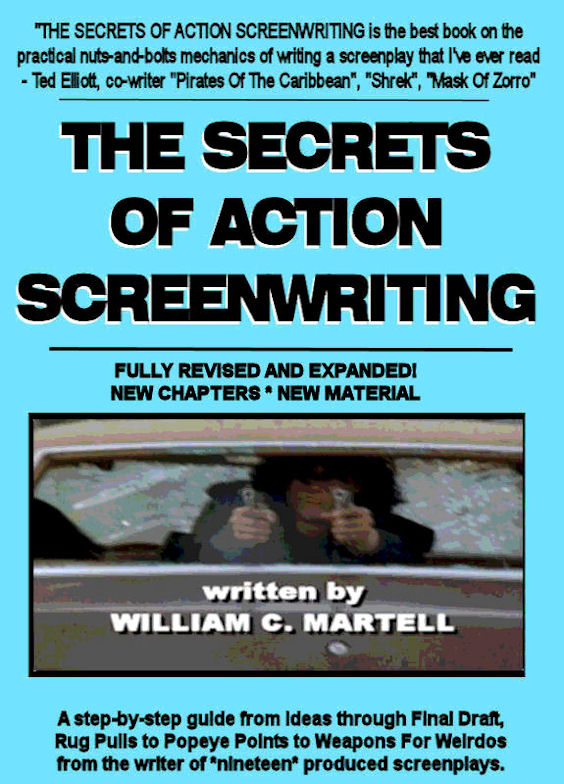
THE BOOK THAT STARTED IT ALL!
*** THE SECRETS OF ACTION SCREENWRITING *** - For Kindle!
*** THE SECRETS OF ACTION SCREENWRITING *** - For Nook!
Why pay $510 for a used version of the 240 page 2000 version that used to retail for $21.95? (check it out!) when
you can get the NEW EXPANDED VERSION - over 500 pages - for just $9.99? New chapters, New examples, New techniques!
"SECRETS OF ACTION SCREENWRITING is the
best book on the practical nuts-and-bolts mechanics of writing a screenplay I've ever read."
- Ted Elliott, co-writer of MASK OF ZORRO, SHREK, PIRATES OF THE CARIBBEAN and the sequels (with Terry Rossio). (ie; 4 of the top 20 Box Office Hits Of ALL TIME.)
Only $9.99 - and no postage!
NO KINDLE REQUIRED! Get the *free* app (any device, except your Mr. Coffee) on the order page on Amazon!
BRAND NEW!
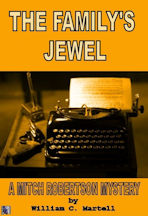
***
MITCH ROBERTSON #2: THE FAMILY'S JEWEL *** - For Kindle!
"The Presidential Suite of the Hollywood Hoover Hotel looked like a bloody battlefield: bodies everywhere, furniture broken, red liquid dripping from the walls, dead soldiers littering the elegant Berber rug as clouds of smoke overhead bounced between two air conditioning vents.
Mitch Robertson stepped over the body of an ex-child star turned sex tape star turned pop star and entered the room, spotted a gun on the floor and picked it up... careful not to spill his coffee with three pumps of mocha syrup from Penny’s Coffee Shop. That coffee was gold, the only thing keeping him going in this dazed state of wakefulness. The gun felt light. Holding it, he saw the silhouette of an 80s action star sitting sideways on a tipped over chair. Motionless. Was he dead? Mitch was still hung over from the Awards Party the night before, and wondered whether this was all some sort of crazy nightmare that he would wake up from... but when he tripped over the brown legs of a bottomless Superhero, flaccid junk encased in a condom but still wearing his mask, and hit the edge of the sofa, gun skittering and coffee spilling, he realized that it was all very real. What the hell had happened here?"
Short Novel. Only 99 cents! - and no postage!
ADVICE FROM 1920!
*** VINTAGE #1: HOW TO WRITE PHOTOPLAYS *** - For Kindle!
***
Screenwriting books have been around as long as films have. This series reprints vintage screenwriting books with a new introduction and history, plus new articles which look at how these lessons from almost 100 years ago apply to today’s screenplays. Anita Loos book is filled with information which still applies.
In addition to the full text of the original book, you get the full screenplay to Miss Loos' hit THE LOVE EXPERT, plus several new articles on the time period and women in Hollywood.
ONLY $2.99 - and no postage!
Tips FAQ

My New Script Secrets Newsletter!


STORY IN ACTION SERIES!

THE MISSION IMPOSSIBLE MOVIES
NEW: Updates On Films 7 & 8 Casting!
All Six Movies analyzed! All of the mission tapes, all of the “that’s impossible!” set pieces and stunts, the cons and capers - and how these scenes work, the twists and double crosses, the tension and suspense (and how to generate it), the concept of each film as a stand alone with a different director calling the shots (broken in the sixth film), the gadgets, the masks, the stories, the co-stars and team members (one team member has been in every film), the stunts Tom Cruise actually did (and the ones he didn’t), and so much more! Over 120,000 words of fun info!
THE MISSION IMPOSSIBLE MOVIES - 347 Pages - Only $3.99 !

BRAND NEW!
*** THE BOURNE MOVIES
NEW: Updates on TREADSTONE TV show!
All five "Bourne" movies (including "Legacy" and it's potential sequels) - what are the techniques used to keep the characters and scenes exciting and involving? Reinventing the thriller genre...
or following the "formula"? Five films - each with an interesting experiment! A detailed analysis of each
of the films, the way these thrillers work... as well as a complete list of box office and critical
statistics for each film. This book is great for writers, directors, and just fans of the series.
Only $3.99 - and no postage!
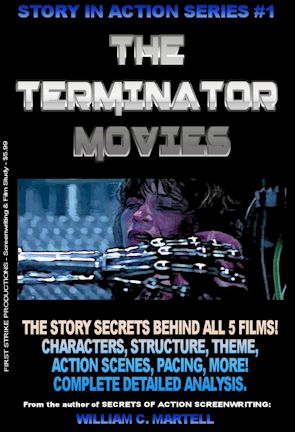
Over 240 pages!
*** THE TERMINATOR MOVIES *** - For Kindle!
He's back! The release of "Terminator: Dark Fate" is set to begin a new trilogy in
the Terminator story... 35 years after the first film was released. What draws us to these films about
a cybernetic organism from the future sent back in time? Why is there a new proposed trilogy every few
years? This book looks at all five Terminator movies from a story standpoint - what makes them work
(or not)? What are the techniques used to keep the characters and scenes exciting and involving? How
about those secret story details you may not have noticed? Containing a detailed analysis of each of
the five films so far, this book delves into the way these stories work... as well as a complete list of
box office and critical statistics for each film. This book is great for writers, directors, and just
fans of the series.
ONLY $3.99 - and no postage!
NO KINDLE REQUIRED! Get the *free* app (any device, except your Mr. Coffee) on the order page on Amazon!
HITCHCOCK FOR WRITERS!
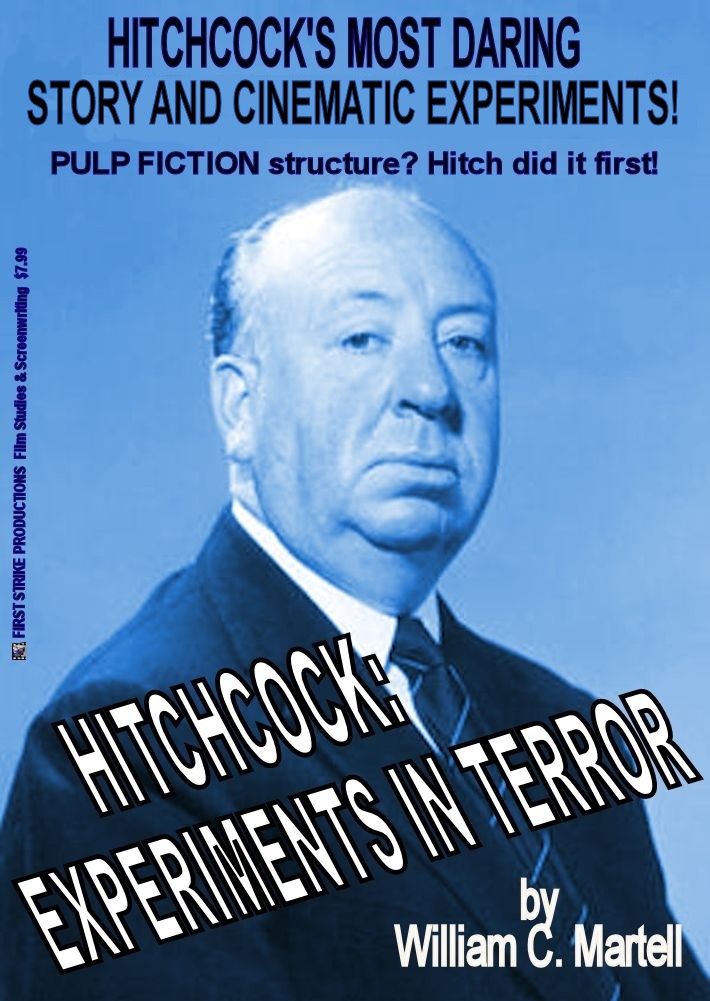
Strange Structures!
*** HITCHCOCK: EXPERIMENTS IN TERROR! *** - For Kindle!
***
Contained Thrillers like "Buried"? Serial Protagonists like "Place Beyond The Pines"? Multiple Connecting Stories like "Pulp Fiction"? Same Story Multiple Times like "Run, Lola, Run"?
HITCHCOCK DID IT FIRST!
This book focuses on 18 of Hitchcock's 52 films with wild cinema and story experiments which paved the way for modern films. Almost one hundred different experiments that you may think are recent cinema or story inventions... but some date back to Hitchcock's *silent* films! We'll examine these experiments and how they work. Great for film makers, screenwriters, film fans, producers and directors.
Only $5.99 - and no postage!
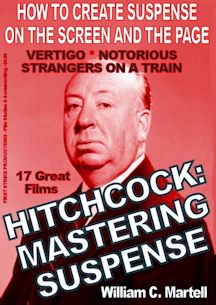
LEARN SUSPENSE FROM THE MASTER!
*** HITCHCOCK: MASTERING SUSPENSE *** - For Kindle!
Alfred Hitchcock, who directed 52 movies, was known as the *Master Of Suspense*; but what exactly is suspense and how can *we* master it? How does suspense work? How can *we* create “Hitchcockian” suspense scenes in our screenplays, novels, stories and films?
This book uses seventeen of Hitchcock’s films to show the difference between suspense and surprise, how to use “focus objects” to create suspense, the 20 iconic suspense scenes and situations, how plot twists work, using secrets for suspense, how to use Dread (the cousin of suspense) in horror stories, and dozens of other amazing storytelling lessons. From classics like “Strangers On A Train” and “The Birds” and “Vertigo” and “To Catch A Thief” to older films from the British period like “The 39 Steps” and “The Man Who Knew Too Much” to his hits from the silent era like “The Lodger” (about Jack The Ripper), we’ll look at all of the techniques to create suspense!
Only $5.99
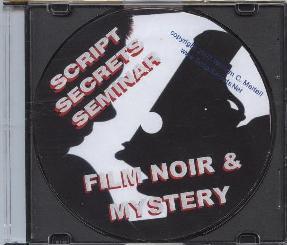
AUDIO CLASS!
NOIR & MYSTERY80 minute CD packed with information on writing Film Noir and Mystery scripts. Using examples from CHINATOWN to OUT OF THE PAST to DOUBLE INDEMNITY you'll learn how to create stories in this dark, twisted genre. How to plant clues, red herrings, suspects, victims, spider women, fallen heroes, the funhouse mirror world of noir supporting characters... and the origins of Film Noir in literature Noir dialogue and how noir endings are different than any other genre. All of the critical elements necessary to write in this critically popular genre.
The Noir & Mystery Class is only $15 (plus $5 S&H). First 20 on Limited Black Disk!
RECESSION SALE! $5 OFF!
IDEAS AND CREATIVITY - 80 minute CD packed with information. Tools to find ideas that are both personal *and* commercial. Hollywood wants scripts with High Concept stories... but not stupid scripts. Developing *intelligent* high concept ideas. How to turn your personal story into a blockbuster - or find your personal story in a high concept idea. Brainstorming and being creative. Ideas and Creativity is $10.00 (plus $5 S&H)
WRITING INDIES - Writing an Indie film? This class covers everything you need to know - from Central Locations to Confined Cameos. Using examples from SWINGERS, THE COOLER, STATION AGENT and others, this 80 minute CD is packed with information. How Indoe films challenge the audience (while mainstream films reassure the audience). Structures, using BOYS DON'T CRY, RUN LOLA RUN, HILARY & JACKIE, and others as example. Writing for a budget, writing for non-actors, getting the most production value out of your budget. Writing Indies is $10.00 (plus $5 S&H)
WRITING HORROR - The essentials of a horror screenplay - what do ROSEMARY'S BABY, NIGHT OF THE LIVING DEAD, THE EXORCIST, BRIDE OF FRANKENSTEIN, THE OTHERS and OPEN WATER have in common? This class will tell you! All of the critical elements necessary to write a script that scares the pants off the audience. Writing Horror is $10.00 (plus $5 S&H).
Click here for more information on CLASS CDs!
THE BLUE BOOKS!
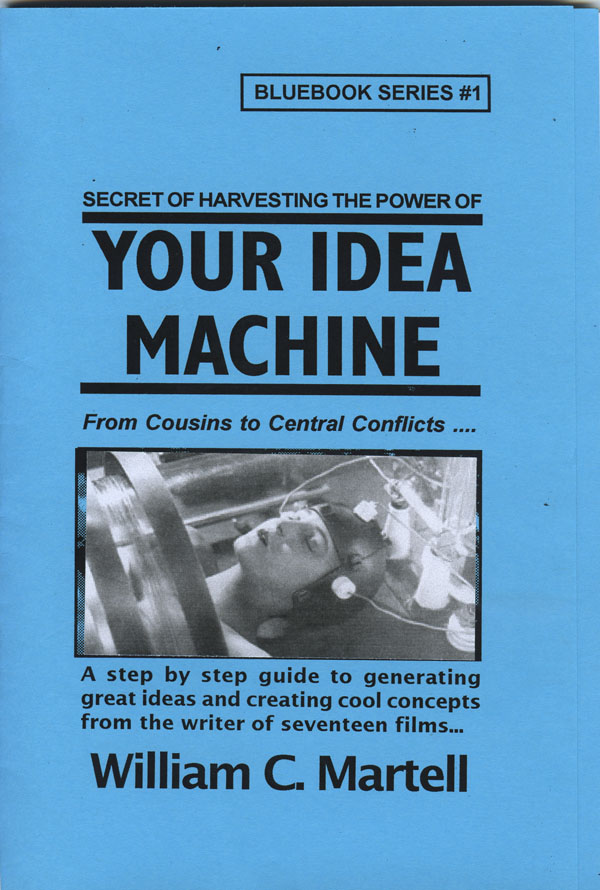
FIND A GREAT IDEA!
*** YOUR IDEA MACHINE *** - For Kindle!
****
Expanded version with more ways to find great ideas! Your screenplay is going to begin with an idea. There are good ideas and bad ideas and commercial ideas and personal ideas. But where do you find ideas in the first place? This handbook explores different methods for finding or generating ideas, and combining those ideas into concepts that sell. The Idea Bank, Fifteen Places To Find Ideas, Good Ideas And Bad Ideas, Ideas From Locations And Elements, Keeping Track Of Your Ideas, Idea Theft - What Can You Do? Weird Ways To Connect Ideas, Combing Ideas To Create Concepts, High Concepts - What Are They? Creating The Killer Concept, Substitution - Lion Tamers & Hitmen, Creating Blockbuster Concepts, Magnification And The Matrix, Conflict Within Concept, Concepts With Visual Conflict, Avoiding Episodic Concepts, much more! Print version is 48 pages, Kindle version is over 175 pages!
Only $4.99 - and no postage!
FIGURE OUT YOUR STORY!
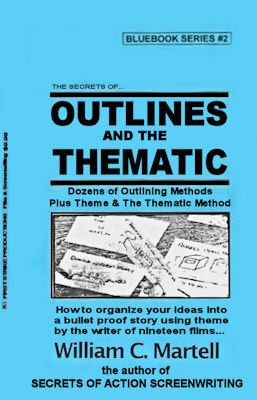
OUTLINES & THE THEMATIC Blue Book.
ARE YOUR SCENES IN THE RIGHT ORDER?
AND ARE THEY THE RIGHT SCENES?
Your story is like a road trip... but where are you going? What's the best route to get there? What are the best sights to see along the way? Just as you plan a vacation instead of just jump in the car and start driving, it's a good idea to plan your story. An artist does sketches before breaking out the oils, so why shouldn't a writer do the same? This Blue Book looks at various outlining methods used by professional screenwriters like Wesley Strick, Paul Schrader, John August, and others... as well as a guest chapter on novel outlines. Plus a whole section on the Thematic Method of generating scenes and characters and other elements that will be part of your outline. The three stages of writing are: Pre-writing, Writing, and Rewriting... this book looks at that first stage and how to use it to improve your screenplays and novels.
Only $4.99 - and no postage!
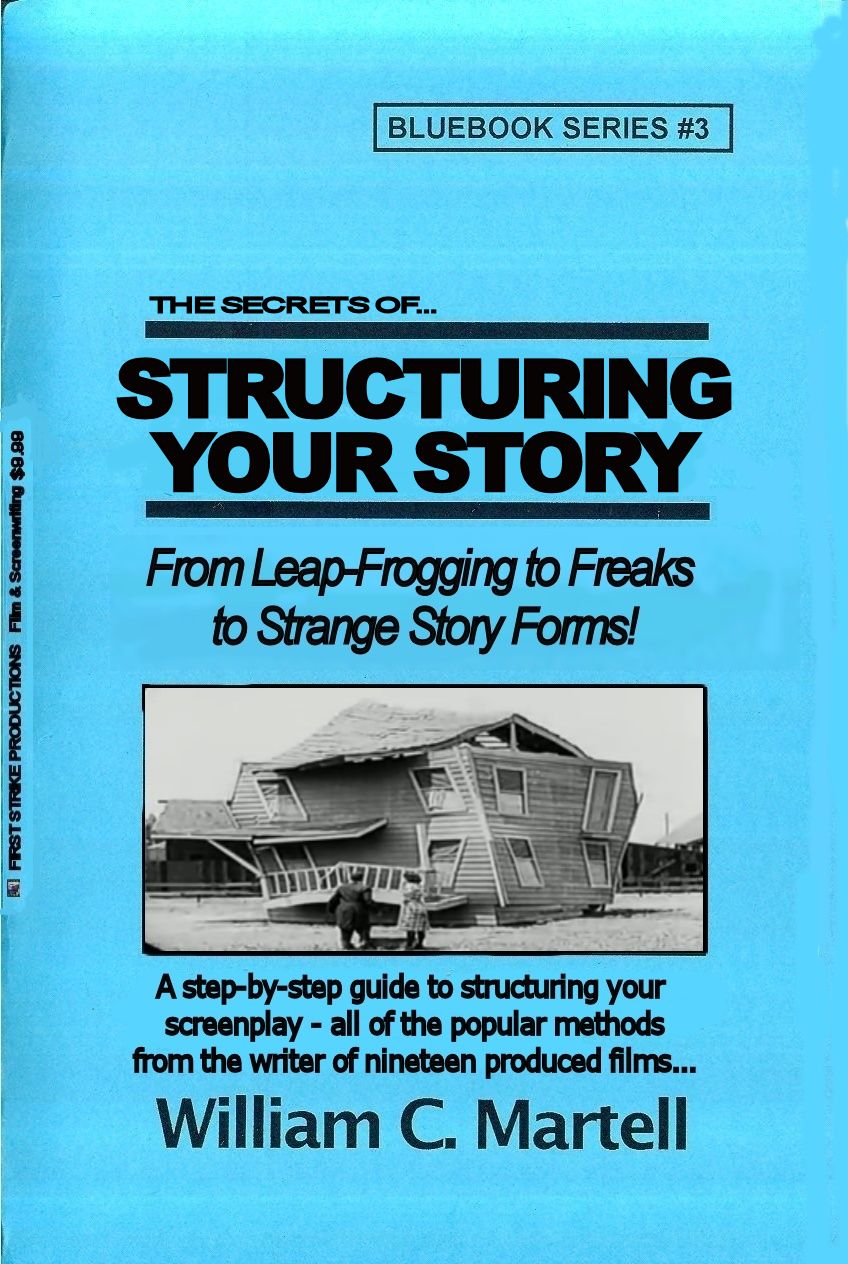
GOT STRUCTURE?!
*** STRUCTURING YOUR STORY *** - For Kindle!
William Goldman says the most important single element of any screenplay is structure. It’s the skeleton under the flesh and blood of your story. Without it, you have a spineless, formless, mess... a slug! How do you make sure your structure is strong enough to support your story? How do you prevent your story from becoming a slug? This Blue Book explores different types of popular structures from the basic three act structure to more obscure methods like leap-frogging. We also look at structure as a verb as well as a noun, and techniques for structuring your story for maximum emotional impact. Most of the other books just look at *structure* and ignore the art of *structuring* your story. Techniques to make your story a page turner... instead of a slug!
Only $4.99 - and no postage!

STORY: WELL TOLD!
*** STORY: WELL TOLD *** - For Kindle!
This book takes you step-by-step through the construction of a story... and how to tell a story well, why Story always starts with character... but ISN'T character, Breaking Your Story, Irony, Planting Information, Evolving Story, Leaving No Dramatic Stone Unturned, The Three Greek Unities, The Importance Of Stakes, The Thematic Method, and how to create personal stories with blockbuster potential. Ready to tell a story?
Print version was 48 pages, Kindle version is over 85,000 words - 251 pages!
Only $4.99 - and no postage!

START STRONG!
*** HOOK 'EM IN TEN *** - For Kindle!
Your story doesn't get a second chance to make a great first impression, and this book shows you a
bunch of techniques on how to do that. From the 12 Basic Ways To Begin Your Story, to the 3 Stars Of
Your First Scene (at least one must be present) to World Building, Title Crawls, Backstory, Starting
Late, Teasers and Pre Title Sequences, Establishing Theme & Motifs (using GODFATHER PART 2), Five Critical
Elements, Setting Up The Rest Of The Story (with GODFATHER), and much more! With hundreds of examples
ranging from Oscar winners to classic films like CASABLANCA to some of my produced films (because
I know exactly why I wrote the scripts that way). Biggest Blue Book yet!
Print version was 48 pages, Kindle version is over 100,000 words - 312 pages!
Only $4.99 - and no postage!
NO KINDLE REQUIRED! Get the *free* app (any device, except your Mr. Coffee) on the order page on Amazon!
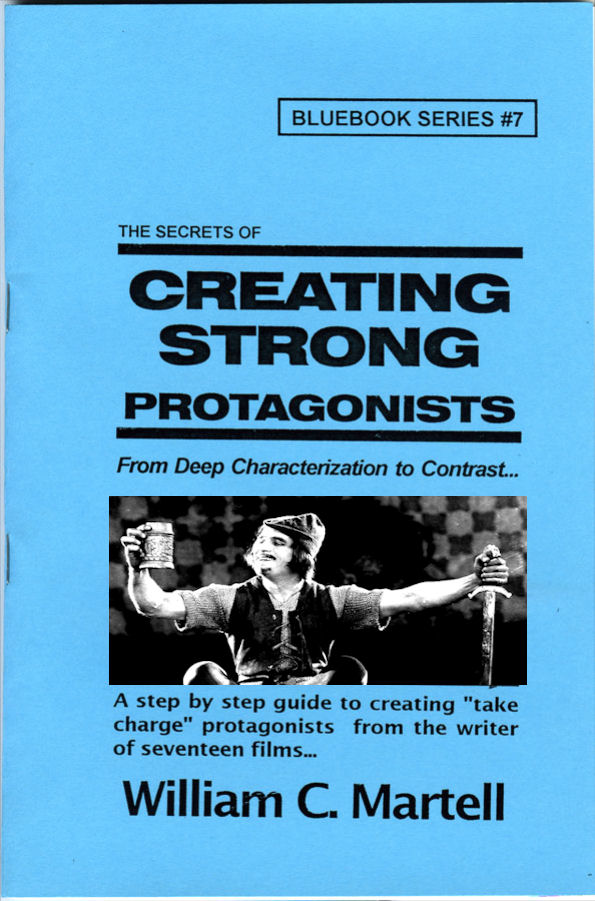
MOVIES ARE CHARACTERS!
*** CREATING STRONG PROTAGONISTS *** - For Kindle!
*** CREATING STRONG PROTAGONISTS *** - For Nook!
Expanded version with more ways to create interesting protagonists! A step-by-step guide to creating "take charge" protagonists. Screenplays are about characters in conflict... characters in emotional turmoil... Strong three dimensional protagonists who can find solutions to their problems in 110 pages. But how do you create characters like this? How do you turn words into flesh and blood? Character issues, Knowing Who Is The Boss, Tapping into YOUR fears, The Naked Character, Pulp Friction, Man With A Plan, Character Arcs, Avoiding Cliche People, Deep Characterization, Problem Protagonists, 12 Ways To Create Likable Protagonists (even if they are criminals), Active vs. Reactive, The Third Dimension In Character, Relationships, Ensemble Scripts, and much, much more. Print version is 48 pages, Kindle version is once again around 205 pages!
ONLY $4.99 - and no postage!
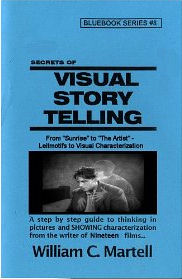
I WRITE PICTURES!
*** VISUAL STORYTELLING *** - For Kindle! (exclusive)
Show Don't Tell - but *how* do you do that? Here are techniques to tell stories visually! Using Oscar Winning Films and Oscar Nominated Films as our primary examples: from the first Best Picture Winner "Sunrise" (1927) to the Oscar Nominated "The Artist" (which takes place in 1927) with stops along the way Pixar's "Up" and Best Original Screenplay Winner "Breaking Away" (a small indie style drama - told visually) as well as "Witness" and other Oscar Winners as examples... plus RISE OF THE PLANET OF THE APES. Print version is 48 pages, Kindle version is over 200 pages!
ONLY $4.99 - and no postage!
DESCRIPTION & VOICE Blue Book!
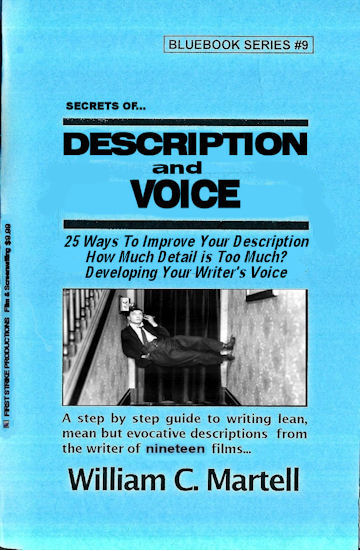
DESCRIPTION & VOICE Blue Book.
IS HALF OF YOUR STORY IN TROUBLE?
Most screenplays are about a 50/50 split between dialogue and description - which means your description is just as important as your dialogue. It just gets less press because the audience never sees it, the same reason why screenwriters get less press than movie stars. But your story will never get to the audience until readers and development executives read your script... so it is a very important factor. Until the movie is made the screenplay is the movie and must be just as exciting as the movie. So how do you make your screenplay exciting to read? Description is important in a novel as well, and the “audience” does read it... how do we write riveting description?
Only $4.99 and no postage!

PRO DIALOGUE TECHNIQUES!
*** DIALOGUE SECRETS *** - For Kindle!
***
Expanded version with more ways to create interesting dialogue! How to remove bad dialogue (and what *is* bad dialogue), First Hand Dialogue, Awful Exposition, Realism, 50 Professional Dialogue Techniques you can use *today*, Subtext, Subtitles, Humor, Sizzling Banter, *Anti-Dialogue*, Speeches, and more. Tools you can use to make your dialogue sizzle! Special sections that use dialogue examples from movies as diverse as "Bringing Up Baby", "Psycho", "Double Indemnity", "Notorious", the Oscar nominated "You Can Count On Me", "His Girl Friday", and many more! Print version is 48 pages, Kindle version is over 175 pages!
Only $4.99 - and no postage!

WHAT IS A SCENE?
*** SCENE SECRETS *** - For Kindle!
***
What is a scene and how many you will need? The difference between scenes and sluglines. Put your scenes on trial for their lives! Using "Jaws" we'll look at beats within a scene. Scene DNA. Creating set pieces and high concept scenes. A famous director talks about creating memorable scenes. 12 ways to create new scenes. Creating unexpected scenes. Use dramatic tension to supercharge your scenes. Plants and payoffs in scenes. Plus transitions and buttons and the all important "flow"... and more! Over 65,000 words! Print version was 48 pages, Kindle version is around 210 pages!
Only $4.99 - and no postage!
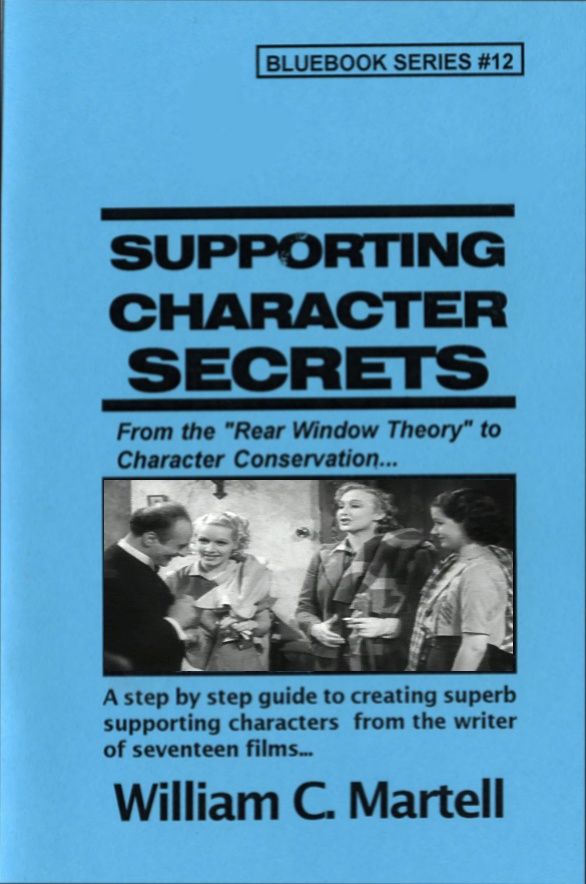
SUBPLOTS?
*** SUPPORTING CHARACTER SECRETS *** - For Kindle! (Exclusive)
Expanded version with more techniques to flesh out your Supporting Characters and make them individuals. Using the hit movie BRIDESMAIDS as well as other comedies like THE HANGOVER and TED and HIGH FIDELITY and
40 YEAR OLD VIRGIN and many other examples we look at ways to make your Supporting Characters come alive on the page.
Print version was 48 pages, Kindle version is around 170 pages!
ONLY $4.99 - and no postage!
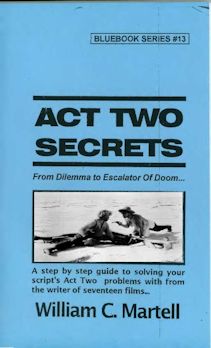
ACT TWO SOLUTIONS!
*** ACT TWO SECRETS *** - For Kindle!
Expanded version with more techniques to help you through the desert of Act Two! Subjects Include: What Is Act Two? Inside Moves, The 2 Ps: Purpose & Pacing, The 4Ds: Dilemma, Denial, Drama and Decision, Momentum, the Two Act Twos, Subplot Prisms, Deadlines, Drive, Levels Of Conflict, Escalation, When Act Two Begins and When Act Two Ends, Scene Order, Bite Sized Pieces, Common Act Two Issues, Plot Devices For Act Two, and dozens of others. Over 67,000 words (that’s well over 200 pages) of tools and techniques to get you through the desert of Act Two alive!
Print version was 48 pages, Kindle version is well over 200 pages!
ONLY $4.99 - and no postage!
BRAND NEW!!
All About Rewrites!
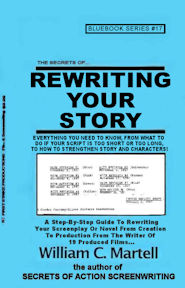
Rewriting In Waves?
*** REWRITES Blue Book! - For Kindle!
The end is just the beginning! You’ve finished your story, but now the rewriting begins! This 405 page book shows you how to rewrite your screenplay or novel to perfection. Everything from Character Consistency to Shoeboxing to How To Give And Receive Notes to 15 Solutions If Your Script’s Too Long! and 15 Solutions If Your Script’s Too Short! to Finding The Cause Of A Story Problem to Good Notes Vs. Bad Notes to Finding Beta Readers to Avoiding Predictability to Learning To Be Objective About Your Work to Script Killer Notes and Notes From Idiots to Production Rewrites and What The Page Colors Mean? and a Complete Rewrite Checklist! The complete book on Rewriting Your Story!
ONLY $4.99 - and no postage!
All About Endings!
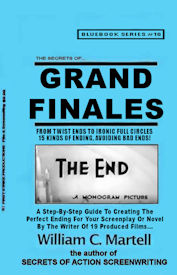
GRAND FINALES Blue Book!
The Perfect Ending For Your Story!
The First Ten Pages Of Your Screenplay Are Critical,
But What About The Last 10 Pages?
Creating the perfect ending to your story! This 100,000 word book shows you how to end your story with a bang, rather than a whimper. Everything from Resolution Order to Act Three Tools to Happy or Sad Endings? to How The Beginning Of Your Story Has Clues To The Ending (in case you were having trouble figuring out how the story should end) to Falling Action to How To Avoid Bad Endings to Writing The Perfect Twist Ending to Setting Up Sequels & Series to Emotional Resolutions to How To Write Post Credit Sequences to Avoiding Deus Ex Machinas, to 20 Different Types Of Ends (and how to write them) and much more! Everything about endings for your screenplay or novel!
Only: $4.99
NO KINDLE REQUIRED! Get the *free* app (any device, except your Mr. Coffee) on the order page on Amazon!
All About LOGLINES, TREATMENTS, and PITCHING!
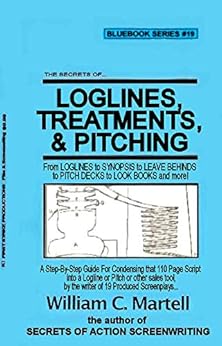
LOGLINES, TREATMENTS, and PITCHING! Blue Book!
Distilling Your Screenplay!
Loglines, Treatments, Pitching, Look Books, Pitch Decks, One Pagers, Rip-O-Matics?
You have written a brilliant 110 page screenplay, but how do you get anyone to read it? You need to distill it down into some form of verbal moonshine or story rocket fuel that will ignite that bored development executive or manager or agent and get them to request your screenplay. But how do you shrink those 110 pages into a 25 word logline or a 2 minute elevator pitch or a one page synopsis or a short paragraph? This 100,000 word book shows you how! Everything you need to know! From common logline mistakes (and how to solve them) to how your pitch can reveal story problems to the 4 types of pitches!
272 Pages - ONLY $4.99!
READY TO BREAK IN?
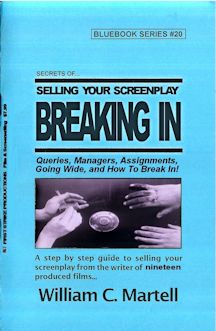
THE BUISINESS SIDE
*** BREAKING IN BLUE BOOK *** - For Kindle!
Should really be called the BUSINESS BLUE BOOK because it covers almost everything you will need to
know for your screenwriting career: from thinking like a producer and learning to speak their language,
to query letters and finding a manager or agent, to making connections (at home and in Hollywood) and
networking, to the different kinds of meetings you are will have at Studios, to the difference between
a producer and a studio, to landing an assignment at that meeting and what is required of you when you
are working under contract, to contracts and options and lawyers and... when to run from a deal!
Information you can use *now* to move your career forward! It's all here in the Biggest Blue Book yet!
Print version was 48 pages, Kindle version is over 400 pages!
$4.99 - and no postage!

Movie Magic Screenwriter is the best selling screenplay formatting software and the choice of Hollywood professionals. Screenwriter automatically formats while you write so you can focus on what you're writing, not where it goes on the page. It also formats for television, stage, novels and comic book scripts so you've got an all in one package for any story you want to write. Academy Award Tech Winner!
* * * Buy It!

|

